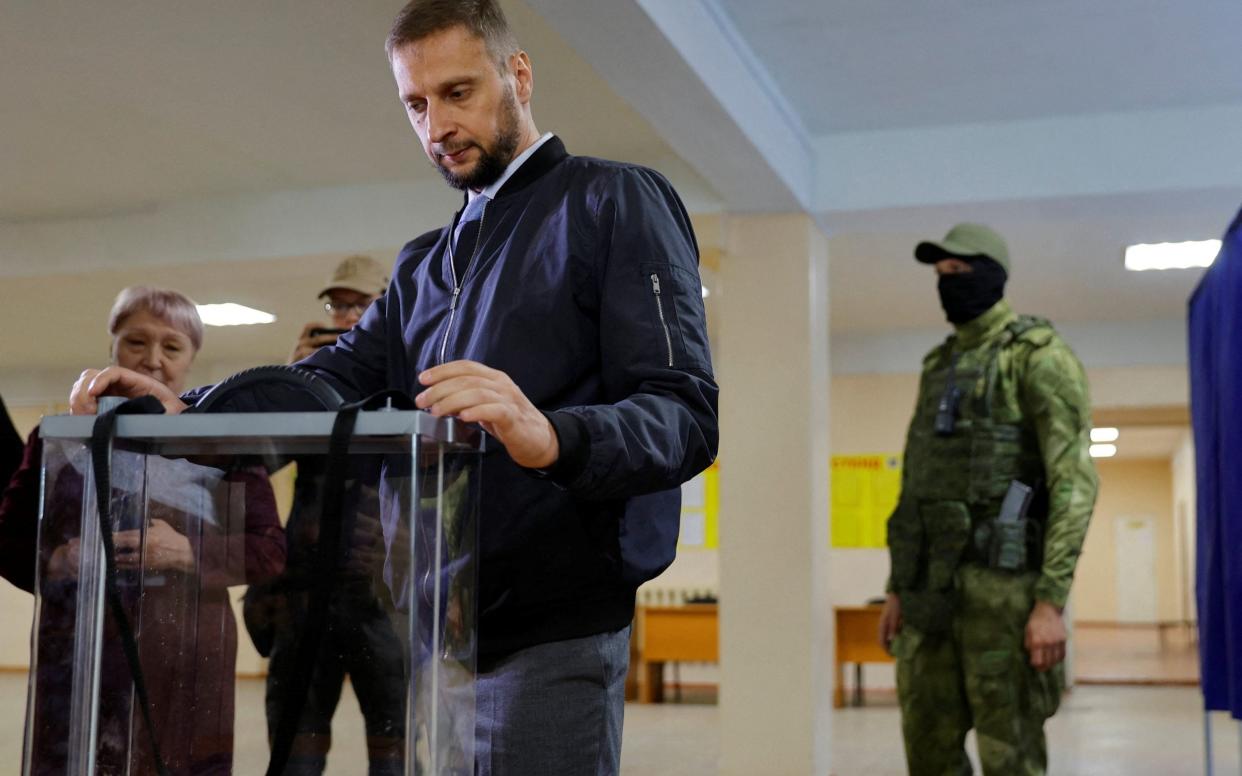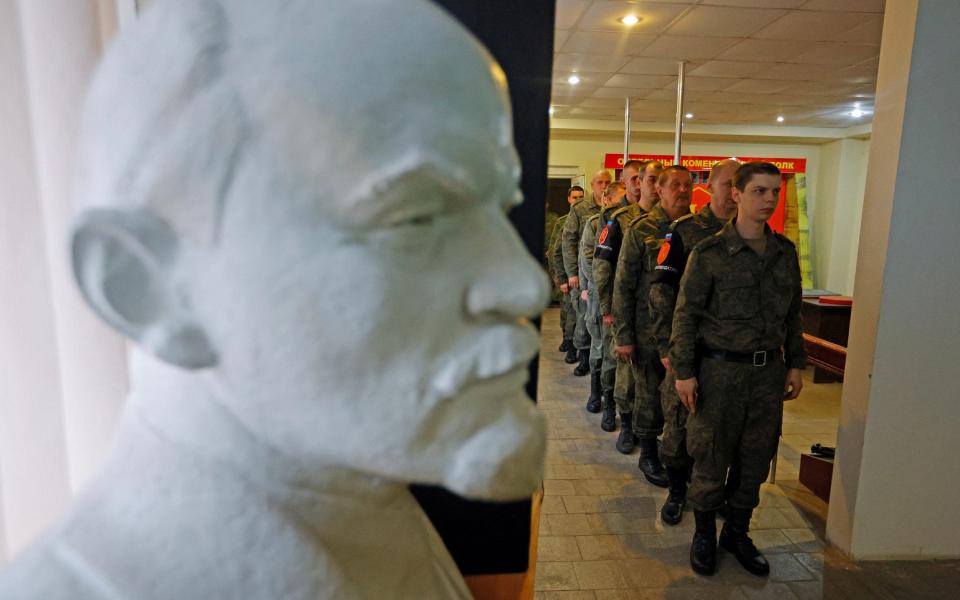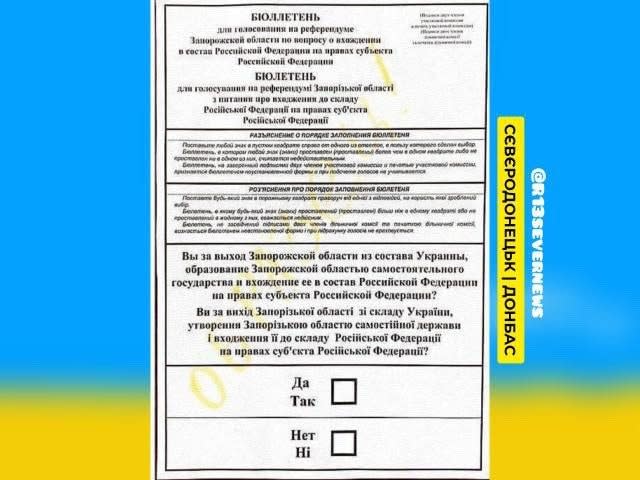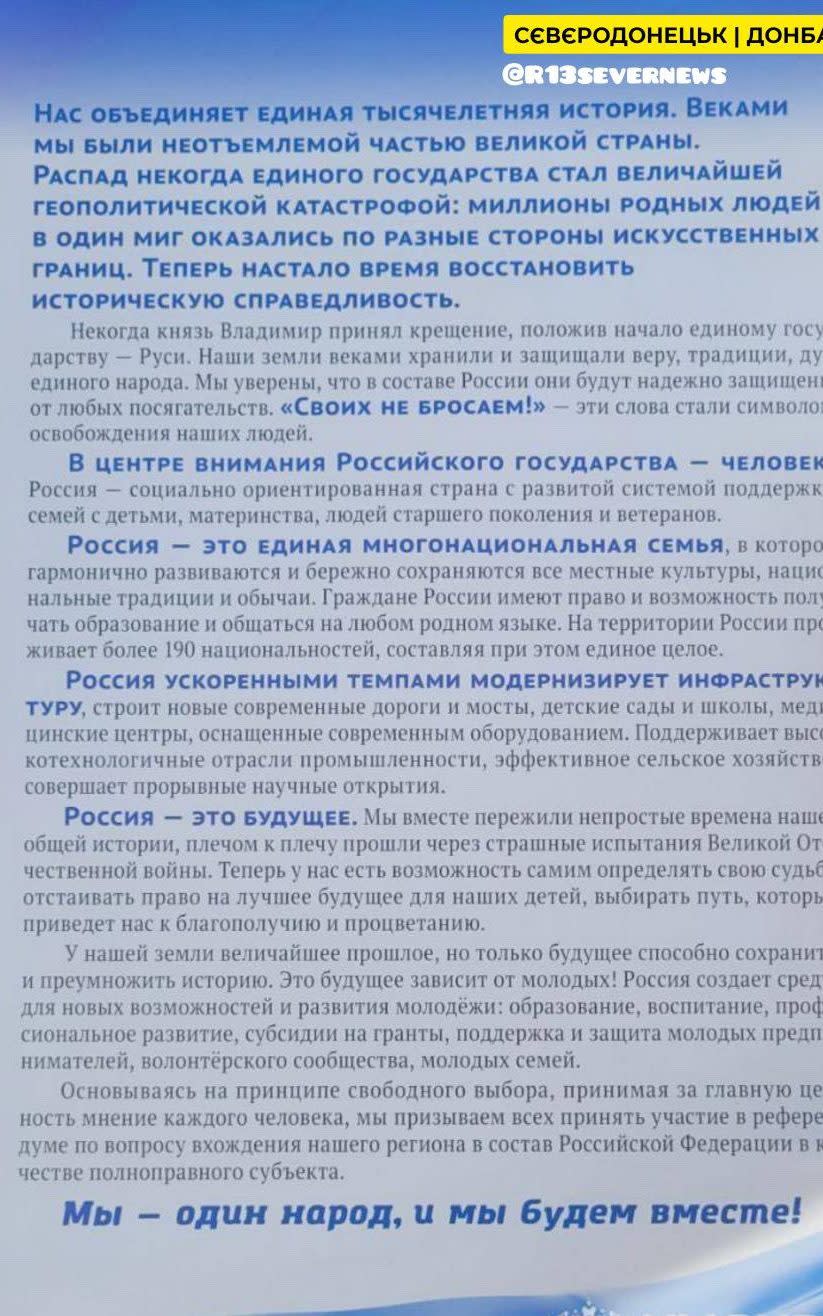Gunmen going door to door forcing Ukrainians to vote in 'sham' referendums

Moscow-backed forces are going door-to-door armed with machine guns forcing Ukrainians to vote in "sham" referendums that will annex newly occupied areas to Russia, sources have told the Telegraph.
Voting began on Friday morning and is expected to continue until Tuesday, with polling stations featuring see-through ballot boxes and armed guards set up across Russian-controlled parts of the Kherson, Luhansk, Zaporizhzhia and Donetsk regions, as well as Russia itself.
Ukrainians living in territory that Moscow has taken since the start of the war have been told their families will be massacred if they refuse to take part, with soldiers sometimes even leaning over their shoulders and watching them as they vote.
“We are forced to go under the pretext of being shot. If we didn’t go, they said that they would shoot or massacre the whole family,” said a resident in Severodonetsk, Luhansk Oblast, who wished to remain anonymous due to fears of reprisals.
“We're scared. At the referendum, turnout is required or arrest or worse. Many are being forced with a threat to life.”
Five Ukrainians based in occupied territory shared similar experiences with the Telegraph.

Moscow-backed officials in these territories announced they will hold votes on the prospect of joining Russia earlier this week, marking a significant escalation in the Kremlin’s plans to annexe Ukraine.
Russian forces have already imposed administrative measures, including introducing the rouble and issuing Russian passports, but the votes will formalise the Kremlin’s control.
Kyiv has decried the referendums as an illegal sham that will not be free or fair and therefore are not valid.
Ivan Fedorov, Ukraine’s elected mayor of Melitopol, has said “participation in a pseudo-referendum is the worst betrayal”.
Serhai Haidai, Ukraine’s governor of Luhansk, said that all those involved in running today’s “referendums” will be punished.
Britain’s ambassador to Ukraine Melinda Simmons described the polls as “a media exercise designed to pursue further an illegal invasion by Russia”.
She added that the results of the “sham referenda” had been “almost certainly already decided”.

In Novoaidar, Luhansk Oblast, armed forces could be seen approaching homes with weapons.
“Residents were informed in advance that for the first three days they will go from house to house to collect votes,” a local said.
“If a person ran away and is not at home on the first day, they will come on the second and so on. It is not possible to refuse because there are two people in front of you with weapons and are aggressive.”
Russian news agency TASS showed officials in courtyards of buildings in Donetsk notifying residents by loudspeaker that voting had started and surrounding a resident while he cast his ballot.
In Bilovodsk, a company director reportedly told employees that voting was compulsory and that anyone refusing to vote will be fired.
Referendum ballots from Zaporizhzhia shared by activists on Telegram Severodonetsk Donbas Live read: "Are you in favour of the departure of the Zaporizhzhia region from Ukraine, the establishment of Zaporizhzhzia as an autonomous state, and its accession to the Russian Federation as a subject of the Russian Federation?"
Maria Khudenova, 21, from Slovyansk, described the referendum as a “complete falsification of votes”.
“Ukraine is a sovereign independent state with fixed borders since 1991. The referendum is held illegally.
“There is no honest election commission and there is a complete falsification of votes. Russia is propaganda. Slovyansk is Ukraine.”


Propaganda leaflets were distributed among locals in Severodonetsk, declaring that “Russia is the future” for Ukraine.
“The collapse of the once unified state became the greatest geopolitical catastrophe: Millions of native people in an instant found themselves on opposite sides of artificial borders,” it said. “Now it is time to restore historical justice.”
“We have the opportunity to determine our own destiny, to defend the right to a better future for our children, to choose the path that will lead us to well-being and prosperity,” it added. “We are one people and we will be together.”
Similar leaflets have been seen across the city of Kherson, according to a local. Another said she planned to avoid Russians by dressing as a child.
“I try to maintain this image of a child, it seems to me that it is safer that way,” the woman, aged 24, said. “I stopped wearing makeup, I don't wear women's clothes. It seems as if a child cannot look dangerous to the occupiers.”
She added that she was “unable to describe” the pain she would feel if Russia annexed her home.
“This is complete despair. I want to cry and scream. Unbearable pain. I dream that it will all end, we live in constant stress. I find grey hair in me, and I'm only 24.”
While Russian forces rule with an iron fist, the rallies seen at the beginning of the occupation have evaporated - but resistance against the referendum remains, moving underground.
A Kherson local described anti-Russian leaflets being shared among her friends encouraging them to abstain from voting.
“As soon as the occupation began, people went to rallies almost every day. Now the residents are fighting more covertly,” she said. “I do not want to feel like a part of those people who all this time were silent.”
Eliza, also from Kherson, said she feared for her family’s safety but remains hopeful for the future.
“I feel scared. I'm not alone here. Here are my family and friends. I am worried that everyone will face this kind of repression.”
“If Kherson became part of Russia I would leave here with great frustration and anger,” she added. “But I am sure that Kherson was, is and will be Ukraine.”
Not everyone was unhappy about the vote, however.
"All of us have been waiting for a referendum on joining Russia for 8 long years," said Leonid Pasechnik, the Russian-backed leader of Luhansk. "We have already become part of Russia. There remains only a small matter – to win (the war)."
"We are returning home," said the Russian-backed leader of Donetsk, Denis Pushilin. "Donbas is Russia."

